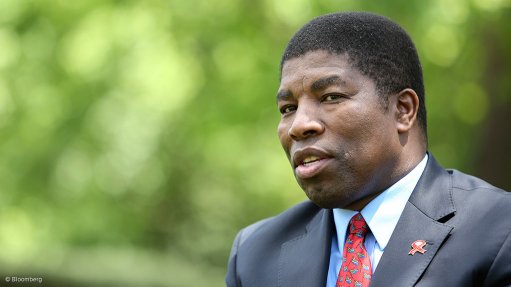
Photo by: Bloomberg
JOHANNESBURG (miningweekly.com) – Chamber of Mines CEO Bheki Sibiya has advocated the establishment of a platform similar to that of the second Convention for a Democratic South Africa's (Codesa 2) – a forum largely credited with South Africa’s successful transition to democracy in the early 1990s – in a bid to moderate the often adversarial-style engagement between business, labour and government in the mining sector.
Addressing a breakfast organised by global engineering, management and specialist technical services company Aurecon on Friday, the former Business Unity South Africa (Busa) head likened the South African economy to a “leaning tower of Pisa”, saying its foundations could only be bolstered through cooperation.
“This ‘leaning tower’ will tilt and fall unless we find something to [strengthen] its foundations… as we have a poor culture of win-win partnerships.
“We need to find a way for [the three sectors of society] to engage with each other, whether it is through the National Economic Development and Labour Council, Busa or a Codesa 2-style forum. If we don’t, we will be in trouble,” he cautioned.
Noting that the business community “had not done as much as it could” to enhance its relationship with labour and government, Sibiya added that the country’s political leadership had been largely reluctant to engage through such a forum.
“Many in the African National Congress (ANC) feel as though the party lost in Codesa 2, so [the idea of engaging through such a platform] sends a shiver down many spines.
“In addition, there is an ‘unholy alliance’ between government and labour, which has a number of faults that we hope can be corrected,” he held.
Commenting more broadly on the country’s economic malaise, Sibiya asserted that South Africa’s currently stagnant performance was the culmination of an economy built on “weak foundations” and debilitated by inadequate primary and secondary education, a poor understanding of the economy by politicians and little comprehension of the transformative potential of high levels of productivity.
Poor labour relations, coupled with an expectation that “government and the private sector will provide” had further dulled growth.
“There has been as expectation since 1995 that government will do this or that for you. But when people are provided for, they don't see the benefit of working hard.
“There is also a mentality that supports the belief that the private sector should provide, which [inhibits] ambition and entrepreneurship,” he asserted.
Moreover, corruption continued to stifle progress in the country, which
lacked visionary leadership as well as individuals that “talked truth to power”.
“That is why [Public Protector] Thuli Madonsela is so popular [and why] I advocate [her], as she is saying, ‘not in our name, not on our watch’.
“At a broad level, we need to affirm leaders that raise their heads above the parapet. They may be a few drops, but these drops can become a flood,” Sibiya enthused.
Describing corruption as a “worm that eats at the core of society”, he added that Parliament was “using its gumboots” to “squash” issues – alluding to the recent breakdown of talks between members of Parliament’s ad-hoc committee on Nkandla represented by the ANC and opposition parties.
Addressing ways of improving the country’s economic and social fundamentals, Sibiya appealed to the private sector to throw its weight behind the National Development Plan, which he believed was well framed to address the State’s critical needs.
“As the private sector, lets do what we can in the interest of the country,” he concluded.